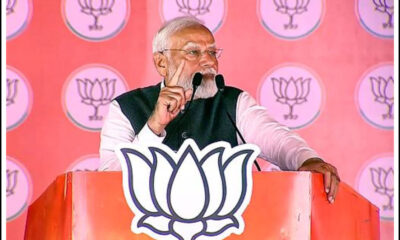Army
US places officers in China under visa sanctions for “forcing assimilation” of Tibetan children
Published
9 months agoon

The younger generations of Tibetans are being targeted by these forceful practises in an effort to eradicate Tibet’s distinctive linguistic, cultural, and religious traditions
In response to China’s “forced assimilation” of children in Tibet, where one million children, according to UN experts, have been taken from their homes, the United States announced Tuesday that it will be slapping visa penalties on Chinese officials.
Secretary of State Antony Blinken announced that the US would restrict visas for Chinese officials who support the concept of state boarding schools as the latest in a string of US actions against Beijing despite the restart of high-level talks.
In a statement, Blinken stated that “these coercive policies seek to eradicate Tibet’s distinctive linguistic, cultural, and religious traditions among younger generations of Tibetans.”
He referred to the People’s Republic of China, saying, “We urge PRC authorities to end the coercion of Tibetan children into government-run boarding schools and to cease repressive assimilation policies, both in Tibet and throughout the PRC.”
Since 2021, the US has accused China of carrying out genocide in Xinjiang through what US government officials, human rights organisations, and eyewitnesses claim to be a large network of forced labour camps. China refutes the accusation.
Invoking US confidentiality provisions on visa records, a State Department representative stated that the new limitations would apply to current and previous officials involved in Tibet’s educational policy but withheld further information.
In response to what Washington claimed were pervasive human rights breaches in Tibet, two high-ranking Chinese officials, Wu Yingjie and Zhang Hongbo, were separately sanctioned by the US in December.
China condemns the’smears’
The US-backed accusations were referred to by China as “smears” that “seriously undermine China-US relations.”
According to Liu Pengyu, spokesman for the Chinese embassy in Washington, “boarding schools in China are established in accordance with the needs of local students as is a common international practise.”
In China’s ethnic minority regions, boarding schools have gradually grown to be one of the key modes of school administration. The centralised system effectively addresses the issue of ethnic minority students’ difficulty travelling to and from school in areas where the local population is dispersed, he added.
Blinken, however, referenced research conducted in February by three UN experts who estimated that almost one million Tibetan students had been forcedfully transferred to boarding schools.
The programme appears to be designed to forcefully integrate Tibetans into China’s Han majority culture, with Mandarin teaching being required and no instruction specific to the Buddhist-dominated Himalayan region.
Thousands of Tibetans have reportedly been coerced into low-skill “vocational training” as a cover for upending their identity, according to a second report from UN specialists this year.
The International Campaign for Tibet, a lobbying organisation associated with the Dalai Lama, the region’s spiritual leader, praised Blinken’s protest of the “unconscionable” separation of youngsters.
Read also:-Turning Chip Firm’s IPO into a Battle for Semiconductor Influence by Apple, Amazon, Microsoft, and Other Arm Clients
“As the Dalai Lama often says, Tibetan culture, based on peace and compassion, has value to offer the entire world,” said Tencho Gyatso, president of the association.
“This boarding school programme targets the most vulnerable and impressionable minds and is aimed at converting Tibetans into Chinese, cementing the Chinese government’s control over Tibet, and annihilating Tibetan culture and way of life,” she said.
Tibet has cycled between independence and Chinese domination over the centuries, with China claiming to have “peacefully liberated” the steep plateau in 1951 and bringing infrastructure and education to the previously undeveloped province.
Since his exile in India in 1959, the Dalai Lama has gained a large following for his spiritual teachings, which have helped bring attention to Tibet.
The dynamic monk has slowed his travels because he is 88 years old. The Dalai Lama has stated he may defy Buddhist tradition and choose his own reincarnation or proclaim the institution extinct because he is concerned Beijing will choose and cultivate a compliant successor despite its official atheism.
You may like
-


On the Citizenship Amendment Act (CAA), PM Narendra Modi challenges Congress and the SP
-


Shortly After Slovak PM’s Assassination, As Crowd Held Gunman
-


Vladimir Putin, the leader of Russia, makes a state visit to China as a symbol of the alliances’ solidarity
-


NASA: Bright, tiny, plant-like creatures discovered in the Celtic Sea
-


Earth’s North Pole is moving more quickly
-


Kiara Advani will make her Cannes Film Festival debut in 2024

